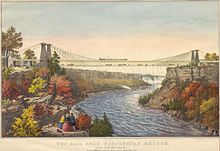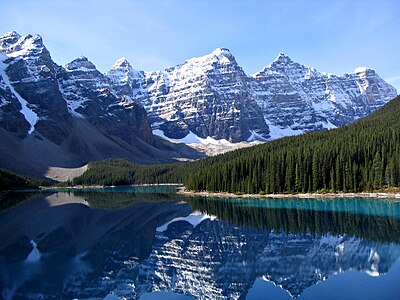Portal:Canada
| Showcase | Contents | Contributing |
Introduction
Canada is a country in North America. Its ten provinces and three territories extend from the Atlantic Ocean to the Pacific Ocean and northward into the Arctic Ocean, making it the world's second-largest country by total area, with the world's longest coastline. Its border with the United States is the world's longest international land border. The country is characterized by a wide range of both meteorologic and geological regions. It is a sparsely inhabited country of just over 41 million people, the vast majority residing south of the 55th parallel in urban areas. Canada's capital is Ottawa and its three largest metropolitan areas are Toronto, Montreal, and Vancouver.
Canada is a parliamentary democracy and a constitutional monarchy in the Westminster tradition. The country's head of government is the prime minister, who holds office by virtue of their ability to command the confidence of the elected House of Commons and is appointed by the governor general, representing the monarch of Canada, the ceremonial head of state. The country is a Commonwealth realm and is officially bilingual (English and French) in the federal jurisdiction. It is very highly ranked in international measurements of government transparency, quality of life, economic competitiveness, innovation, education and gender equality. It is one of the world's most ethnically diverse and multicultural nations, the product of large-scale immigration. Canada's long and complex relationship with the United States has had a significant impact on its history, economy, and culture.
A developed country, Canada has a high nominal per capita income globally and its advanced economy ranks among the largest in the world, relying chiefly upon its abundant natural resources and well-developed international trade networks. Recognized as a middle power, Canada's strong support for multilateralism and internationalism has been closely related to its foreign relations policies of peacekeeping and aid for developing countries. Canada is part of multiple international organizations and forums. (Full article...)
Featured article -
The Niagara Falls Suspension Bridge stood from 1855 to 1897 across the Niagara River and was the world's first working railway suspension bridge. It spanned 825 feet (251 m) and stood 2.5 miles (4.0 km) downstream of Niagara Falls, where it connected Niagara Falls, Ontario to Niagara Falls, New York. Trains used the upper of its two decks, while pedestrians and carriages used the lower. The bridge was the idea of Canadian politicians, and it was built by an American company and a Canadian company. It was most commonly called the Suspension Bridge, although other names included Niagara Railway Suspension Bridge, Niagara Suspension Bridge, and its official American name of the International Suspension Bridge. (Full article...)
Featured biography -
Neil Ellwood Peart OC (/pɪərt/ PEERT; September 12, 1952 – January 7, 2020) was a Canadian and American musician, known as the drummer and primary lyricist of the rock band Rush. He was known to fans by the nickname 'The Professor', derived from the Gilligan's Island character of the same name. His drumming was renowned for its technical proficiency and his live performances for their exacting nature and stamina. Peart earned numerous awards for his musical performances, including an induction into the Modern Drummer Readers Poll Hall of Fame in 1983 at the age of thirty, making him the youngest person ever so honoured. (Full article...)
Selected panorama -
Panoramic view of Mont-Tremblant, Quebec
Credit: Acarpentier (Alain Carpentier)
National symbol -
The Royal Canadian Mounted Police (RCMP; French: Gendarmerie royale du Canada; GRC) is the national police service of Canada. The RCMP is an agency of the Government of Canada; it also provides police services under contract to 11 provinces and territories, over 150 municipalities, and 600 Indigenous communities. The RCMP is commonly known as the Mounties in English (and colloquially in French as la police montée). (Full article...)
Selected vital article -

The orders, decorations, and medals of Canada comprise a complex system by which Canadians are honoured by the country's sovereign for actions or deeds that benefit their community or the country at large. Modelled on its British predecessor, the structure originated in the 1930s, but began to come to full fruition at the time of Canada's centennial in 1967, with the establishment of the Order of Canada, and has since grown in both size and scope to include dynastic and national orders, state, civil, and military decorations; and various campaign medals. The monarch in right of each Canadian province also issues distinct orders and medals to honour residents for work performed in just their province. The provincial honours, as with some of their national counterparts, grant the use of post-nominal letters and or supporters and other devices to be used on personal coats of arms. (Full article...)
Selected picture -
Current events
- September 25, 2024 –
- Canadian Prime Minister Justin Trudeau survives a no-confidence vote by a vote of 211–119. (BBC News)
- September 24, 2024 –
- Scientists from the University of Waterloo announce that they have positively identified bones found on King William Island in Nunavut, Canada, as those of James Fitzjames, captain of HMS Erebus during Franklin's lost expedition. (CBC News)
- September 20, 2024 –
- Three people are injured in a stabbing attack at a mosque in Châteauguay, Montreal, Quebec, Canada. The perpetrator is arrested and charged. (CTV News)
- September 9, 2024 –
- Finnish-Canadian sportswear mogul Peter Nygård is sentenced to 11 years in prison for sexual assault. (CBC News)
- September 4, 2024 –
- In Canada, New Democratic Party leader Jagmeet Singh announces that he has terminated the confidence and supply agreement his party made with Prime Minister Justin Trudeau's Liberal government in 2022. (CBC News)
- August 27, 2024 – Canada–Mexico relations, Mexico–United States relations
- Mexico suspends all interactions with the Canadian and American embassies in Mexico City due to claimed interference with its independence and internal affairs after both ambassadors criticized reform plans for members of the judiciary, up to and including Supreme Court justices, to be elected by popular vote. (Reuters)
Did you know -

- ... that when the Canadian baritone Iain MacNeal appeared as Odysseus in Dallapiccola's Ulisse at the Oper Frankfurt, a reviewer noted that he portrayed the "character's self-exegeses"?
- ... that the anniversary of the Singh v Canada decision is observed as Refugee Rights Day?
- ... that Theo Benedet is the first offensive lineman to be named the best Canadian university football lineman two years in a row?
- ... that the relative rarity of the radiodont Titanokorys (video featured) in Marble Canyon suggests that the deposits in which it was found may represent the outermost edge of its distribution in life?
- ... that Zebedee Nungak, taken as a child for an experiment by the Canadian government, went on to "cross antlers with prime ministers, premiers and Québec separatists"?
- ... that Canadian cricketer Divya Saxena was accused of obstructing the field in an international match but was ruled "not out"?
- ... that Ausma Malik is the first hijab-wearing Muslim woman to be elected to public office in Canada?
Featured list -
The Parliament of Canada is the legislative body of the government of Canada. The Parliament is composed of the House of Commons (lower house), the Senate (upper house), and the sovereign, represented by the governor general. Most major legislation originates from the House, as it is the only body that is directly elected. A new parliament begins after an election of the House of Commons and can sit for up to five years. The number of seats in parliament has varied as new provinces joined the country and as population distribution between the provinces changed; there are currently 338 House MPs and 105 Senators (when there are no vacancies). (Full article...)
Main articles
Associated Wikimedia
The following Wikimedia Foundation sister projects provide more on this subject:
-
Commons
Free media repository -
Wikibooks
Free textbooks and manuals -
Wikidata
Free knowledge base -
Wikinews
Free-content news -
Wikiquote
Collection of quotations -
Wikisource
Free-content library -
Wikiversity
Free learning tools -
Wikivoyage
Free travel guide -
Wiktionary
Dictionary and thesaurus
































